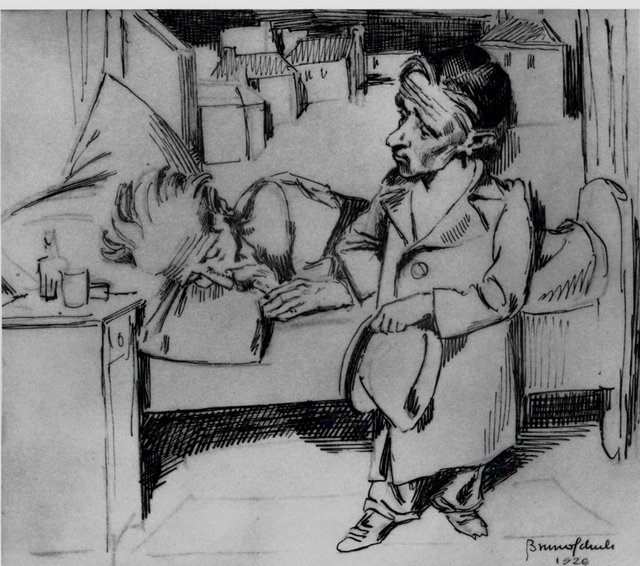“The Strange Afterlife of Bruno Schulz,” by Jaimy Gordon, appeared in MQR’s Winter 2004 issue.
*
Out of the Cul-de-Sac
Bruno Schulz was one of two great Polish fiction writers of the two decades between the wars, and so luckless was he, so lucky are we by comparison, that we may read his complete works in one long, trash-blown, weedy, windy, starry, swirling, Lower Carpathian day. His complete surviving works, that is—and that is the legendary pity of it. Such a day need not even take up your time, for you may go there in time according to Schulz, a limb of freak time that sprouts seamlessly out of time as we think we know it. Here is time as Schulz has it in “The Night of the Great Season,” from Cinnamon Shops, his first collection:
It sometimes happens that August has passed, and yet the old thick trunk of summer continues by force of habit to produce and from its moldered wood grow those crab-days, weed-days, sterile and stupid, added as an afterthought; stunted, empty, useless days—white days, permanently astonished and quite unnecessary. They sprout, irregular and uneven, formless and joined like the fingers of a monster’s hand, stumps folded into a fist. . . .
The events I am now going to relate happened in that thirteenth, supernumerary, freak month of that year, on those blank pages of the great chronicles of the calendar.
Freak time, idle, misshapen, vacant, unclaimed by others—this was the time Schulz chose to work in. Schulz didn’t want any arguments with the legal owners of time. He didn’t want any fights with anybody, not because he was a coward—although he lived in times so brutal that they made a coward, some say, even out of the magisterially truculent Witold Gombrowicz, the other great Polish fiction writer of the interwar period, who spent the war years (and many more) in Argentina.
But Schulz, a Jew who could not summon the will to leave his small native city of Drohobycz in East Galicia even in wartime, after the danger was clear, was not equipped for worldly escapes. Schulz yielded to anyone, great or small, to the SS-Hauptscharführer Felix Landau whose artist slave he was in the last year of his life, but also to schoolboys. His biographer Jerzy Ficowski quotes one who knew him: “Schulz, even had he been forced to fight for eternal life, would not have lifted a club.” Henryk Grynberg’s harrowing oral history of Drohobycz during the war years describes the writer in the classical high school where he taught, just before the war.
He walked sloping toward the walls, obliquely, almost sidelong, with his head lowered, making way for everybody. Sometimes he took part in Sunday afternoon readings at the private Jewish gymnasium named after Leon Sternbach. He didn’t read, he improvised. Nobody read his Cinnamon Shops or Sanatorium under the Sign of the Hourglass, because they were too difficult, but everyone listened to him carefully.
Making way for everybody. Schulz could hold high school boys spellbound with a tale so hypnotic and strange that no one could recall a word of it later, but to elbow his way into “legal” time or space was repugnant to him. Everyone who writes of Schulz describes him as timid and shy, but this conception is made at least more complex by a glimpse of a certain willfulness behind his passivity. In 1934, not long after the appearance of Cinnamon Shops, Schulz wrote to a friendly reviewer that he was troubled by a “private malady”:
Mine is marked by a paradoxical fastidiousness: it is dominated by the fixed idea of a virginity of time. Just as for some rajah of melancholy and insatiable disposition any woman brushed by a male glance is already tainted and thereby unfit for anything but the silken noose, so for me any piece of time someone has laid claim to, has even casually mentioned in passing, is already marred, spoiled, unfit for consumption. I can’t stand people laying claim to my time. They make the scrap they touched nauseating to me. I am incapable of sharing time, of feeding on somebody’s leftovers. (These are the kinds of words jealous lovers use.)
Time could not be shared or negotiated. The better course, the only course, was to fabricate time for himself, to steal away with an inconspicuous loop of freak time and fill it with his own time, out of the way of all intruders, rivals, authorities. His inner time was lush and infinitely expansive, so expansive it was frightening again, for its plasticity might be uncontrollable and its language was the seductive but treacherous language of his “treasured, detested loneliness,” as John Updike put it. Once Schulz found his opening in time, his hidden, illicit cul-de-sac, he could either wave a mischievous baton at the theatricality of matter endlessly transforming itself, or, as he saw it a little later, he could speak from an inner world as replete as a child’s, as if out of that “‘age of genius’ that supposedly existed in my life once upon a time, not in any calendar year but on a level above chronology, an age when everything blazed with godly colors and one took in the whole sky with a single breath, like a gulp of pure ultramarine” (6 January 1934, Letters, 51). For, somewhere between the appearance of his first book and his second, Schulz began to look backwards toward a primal aesthetic moment whose totality of vision he took as his own lost messiah, since he could not find his way there again.
“The Age of Genius,” one of Schulz’s greatest stories, and probably among the last two or three he finished, distills the complete passion of Schulz early and late. Its plot begins in such a moment, described with feverish luxury, when the narrator as a child receives direct, terrifying revelation of the infinite from a square of sunlight shimmering on the carpet, and he begins to draw his visions: in this moment he becomes an artist. And that is the first half of the story. But before Schulz dares to invoke this primal moment in all its opulence and rapture, a rather dry and wily narrator ushers the reader into the cul-de-sac. Here time loops off into the liberty of the void like a pirate railroad line:
Could it be that time is too narrow for all events? Could it happen that all the seats within time might have been sold? Worried, we run along the train of events, preparing ourselves for the journey.
For heaven’s sake, is there perhaps some kind of bidding for time? Conductor, where are you? . . .
Have you ever heard of parallel streams of time within a two-track time? Yes, there are such branch lines of time, somewhat illegal and suspect, but when, like us, one is burdened with contraband of supernumerary events that cannot be registered, one cannot be too fussy. Let us try to find at some point of history such a branch line, a blind track onto which to shunt these illegal events. There is nothing to fear. It will all happen imperceptibly: the reader won’t feel any shock. Who knows? Perhaps even now, while we mention it, the doubtful maneuver is already behind us and we are, in fact, proceeding into a cul-de-sac.
In the second half of the story, the boy meets Shloma the thief—whose name is Jewish but who is clearly an ironic Christ figure emerging from winter darkness (he comes out of his hole, the local hoosegow, at Easter) as well as the debauched double of the innocent boy-artist with whom he is “alone in the whole square” and, in effect, the whole world. The scene takes place in the main square of town between the police station and the Church of the Holy Trinity; on a day like this, we are told, “the Messiah advances to the edge of the horizon” and watches the whole thing—although nothing comes of it. For all the burlesque futility of its Messiah, still “The Age of Genius” is as fair a vision of hope as Schulz’s world could support, just five years before the Holocaust: in the main square of an unnamed Drohobycz, a luminous tableau of springtide Central European syncretism, pagan, civil, Jewish, and Catholic. And erotic: in the last moment of the story, Shloma, who has been offered a look at a fabulous text, or picture, or both, called “the great Original,” steals the housemaid Adela’s shoe (and dress, and beads) instead.
Especially in Schulz’s earlier fiction, the cul-de-sac, somewhat illegal and suspect, out of the way yet teeming, teems in space as well as time: As Schulzian time sprouts weedily out of legal and authorized time, so Schulzian space falls out of space, rooms spill out of rooms or cave in on themselves and burgeon. In the long story “Tailors’ Dummies,” from Cinnamon Shops, the father, owner of a failing clothing shop, who is so often the spokesman for Schulz in a self-parodying philosophical mood—for Father is always, simultaneously, a wretched puny failure perched for hours on a chamberpot and a seer close to God—explains this principle in “a series of most interesting and most unusual lectures” to two shopgirls.
“As you will no doubt know,” said my father, “in old apartments there are rooms which are sometimes forgotten. Unvisited for months on end, they wilt neglected between the old walls and it happens that they close in on themselves, become overgrown with bricks, and, lost once and for all to our memory, forfeit their only claim to existence. The doors, leading to them from some backstairs landing, have been overlooked by people living in the apartment for so long that they merge with the wall, grow into it, and all trace of them is obliterated in a complicated design of lines and cracks.
“Once early in the morning toward the end of winter,” my father continued, “after many months of absence, I entered such a forgotten passage, and I was amazed at the appearance of the rooms.
“From all the crevices in the floor, from all the moldings, from every recess, there grew slim shoots filling the gray air with a scintillating filigree lace of leaves: a hothouse jungle, full of whispers and flickering lights—a false and blissful spring.”
I will stop there, but Father has barely begun to inventory the “make-believe of matter” that luxuriated in that room. Matter transforms itself, blissfully, theatrically, not a little disgustingly, and, at bottom, falsely. In Schulz, every ecstasy of the imagination is followed hard on by its own debunking. The disclaimer is its mask of penitence and shield. Like the shopgirls, we are aware of the self-ridiculing grandiosity of the father’s “lectures,” and Father himself allows that transformation has its price. These cheap and bogus fertilities drift easily out of control, into comic degeneracy:
“Am I to conceal from you,” he said in a low tone, “that my own brother, as a result of a long and incurable illness, has been gradually transformed into a bundle of rubber tubing, and that my poor cousin had to carry him day and night on his cushion, singing to the luckless creature endless lullabies on winter nights? Can there be anything sadder than a human being changed into the rubber tube of an enema? What disappointment for his parents, what confusion for their feelings, what frustration of the hopes centered around the promising youth!”
It’s the man as enema that finally sets off the shopgirls. They turn Father over to the housemaid Adela to be tickled into submission:
“Oh, please, I cannot, I really cannot listen to this any longer!” groaned Polda leaning over her chair. “Make him stop, Adela.”
And she does.
Forgotten rooms full of fecund weedy rot, culs-de-sac choked with rampant weeds and trash, “astral dough,” unmade beds that are a kind of dough, bedclothes in which a character swells like dough or that suck him in as if he had fallen in dough—images like these, of a clandestine yet boundless (and finally uncontrollable and menacing) fertility, are everywhere in Schulz. Unseen space mushrooms, empty drawers pulled open one last time now have objects in them. It’s in these freak limbs of time and space, in these forgotten but never finally vacant drawers, where Bruno Schulz operates, where his sly fantasy and profuse idiosyncrasy are at home. A small and hunched, guarded, depressive (he had reason to be depressed), solitary man, obedient to his small-town family duties and to the exigencies of making a living, eventually bearing the whole load of support of his sickly family, anxiously polite and much given to apologies in the letters through which he carried on his brief career, he nevertheless had to find space and time for the force and strange fertility of his imagination, and this he did, being the least confrontational of men, by interpolating liberties of space and time into unused, unseen angles of the conventional order of things. He filled invisible rifts in space and time with a richness—cheap and doughy, perhaps, frankly false, if you insist, but still, a richness—at once novel and somehow native to the real world that so lately had looked complete without it.
Later on in his brief career, in the forum of magazines, replying to writers of the stature of Gombrowicz and Stanisław Ignacy Witkiewicz who were now his peers, Schulz was able to assert more boldly that modernity has it wrong about which world is the real one. He would write, in 1936, in his essay “The Mythologizing of Reality,” that in modernity “the life of the word, its development, was shunted onto a new track, the track of mundane life,” and that it was the role of poetry to find its way back to “its former connections.” But by now Schulz wasn’t writing much new fiction any more, because he himself had lost the way back—or lamented that he had, in letter after letter.
*
Image: Bruno Schulz, “Father in the Sanatorium,” 1926. Courtesy of the Estate of Bruno Schulz.




